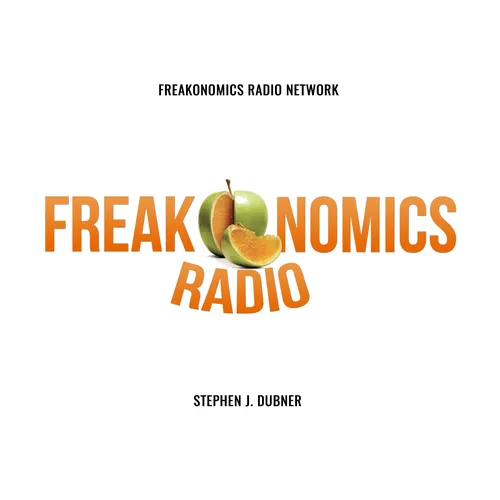
Freakonomics Radio
Freakonomics co-author Stephen J. Dubner uncovers the hidden side of everything. Why is it safer to fly in an airplane than drive a car? How do we decide whom to marry? Why is the media so full of bad news? Also: things you never knew you wanted to know about wolves, bananas, pollution, search engines, and the quirks of human behavior.
To get every show in the Freakonomics Radio Network without ads and a monthly bonus episode of Freakonomics Radio, start a free trial for SiriusXM Podcasts+ on Apple Podcasts or by visiting siriusxm.com/podcastsplus.
- Update frequency
- every 5 days
- Average duration
- 41 minutes
- Episodes
- 857
- Years Active
- 2010 - 2025

Is It Okay for Restaurants to Racially Profile Their Employees? (Rebroadcast)
We seem to have decided that ethnic food tastes better when it's served by people of that ethnicity (or at least something close). Does this make sense -- and is it legal?

255. Ten Ideas to Make Politics Less Rotten
We Americans may love our democracy -- at least in theory -- but at the moment our feelings toward the federal government lie somewhere between disdain and hatred. Which electoral and political ideas…

254. What Are Gender Barriers Made Of?
Overt discrimination in the labor markets may be on the wane, but women are still subtly penalized by all sorts of societal conventions. How can those penalties be removed without burning down the ho…

253. Is the Internet Being Ruined?
It's a remarkable ecosystem that allows each of us to exercise control over our lives. But how much control do we truly have? How many of our decisions are really being made by Google and Facebook an…

252. Confessions of a Pothole Politician
Eric Garcetti, the mayor of Los Angeles, has big ambitions but knows he must first master the small stuff. He's also a polymath who relies heavily on data and new technologies. Could this be what mod…

The Suicide Paradox (Rebroadcast )
There are more than twice as many suicides as murders in the U.S., but suicide attracts far less scrutiny. Freakonomics Radio digs through the numbers and finds all kinds of surprises.

How Much Does the President Really Matter? (Rebroadcast)
The U.S. president is often called the "leader of free world." But if you ask an economist or a Constitutional scholar how much the occupant of the Oval Office matters, they won't say much. We look a…

Why Do We Really Follow the News? (Rebroadcast)
There are all kinds of civics-class answers to that question. But how true are they? Could it be that we like to read about war, politics, and miscellaneous heartbreak simply because it's (gasp) ente…

Time to Take Back the Toilet
Public bathrooms are noisy, poorly designed, and often nonexistent. What to do?

251. Are We in a Mattress-Store Bubble?
You've seen them — everywhere! — and often clustered together, as if central planners across America decided that what every city really needs is a Mattress District. There are now dozens of online r…

250. Why Does Everyone Hate Flying? And Other Questions Only a Pilot Can Answer
Patrick Smith, the author of Cockpit Confidential, answers every question we can throw at him about what really happens up in the air. Just don't get him started on pilotless planes -- or whether the…

249. The Longest Long Shot
When the uncelebrated Leicester City Football Club won the English Premier League, it wasn't just the biggest underdog story in recent history. It was a sign of changing economics — and that other im…

248. How to Be Tim Ferriss
Our Self-Improvement Month concludes with a man whose entire life and career are one big pile of self-improvement. Nutrition? Check. Bizarre physical activities? Check. Working less and earning more?…

247. How to Win Games and Beat People
Games are as old as civilization itself, and some people think they have huge social value regardless of whether you win or lose. Tom Whipple is not one of those people. That's why he consulted an ar…

246. How to Get More Grit in Your Life
The psychologist Angela Duckworth argues that a person's level of stick-to-itiveness is directly related to their level of success. No big surprise there. But grit, she says, isn't something you're b…

245. Being Malcolm Gladwell
"Books are a pain in the ass," says Gladwell, who has written some of the most popular, influential, and beloved non-fiction books in recent history. In this wide-ranging and candid conversation, he …

244. How to Become Great at Just About Anything
What if the thing we call "talent" is grotesquely overrated? And what if deliberate practice is the secret to excellence? Those are the claims of the research psychologist Anders Ericsson, who has be…

243. How to Be More Productive
It's Self-Improvement Month at Freakonomics Radio. We begin with a topic that seems to be on everyone's mind: how to get more done in less time. First, however, a warning: there's a big difference be…

242. Is the World Ready for a Guaranteed Basic Income?
A lot of full-time jobs in the modern economy simply don't pay a living wage. And even those jobs may be obliterated by new technologies. What's to be done so that financially vulnerable people aren'…

241. Are Payday Loans Really as Evil as People Say?
Critics -- including President Obama -- say short-term, high-interest loans are predatory, trapping borrowers in a cycle of debt. But some economists see them as a useful financial instrument for peo…